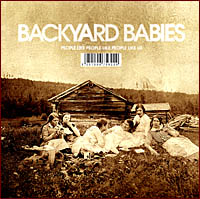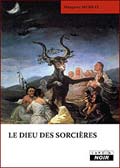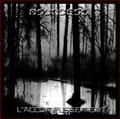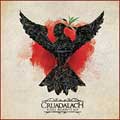BACKYARD BABIES (se) - People Like People Like People Like Us (2006)

Label : Century Media / Nocturne
Sortie du Scud : 24 Avril 2006
Pays : Suède
Genre : Hard Rock’n Roll
Type : Album
Playtime : 12 Titres - 39 Mins
BACKYARD BABIES poursuit sa mue après un Stockholm Syndrome dans lequel l’énergie et la spontanéité avaient été sérieusement amputés. People Like... semble formaté pour les radios tant chaque titre ou presque est construit autour d’une jolie mélodie et bénéficie d’un refrain accrocheur. Avec de tels ingrédients il est difficile de faire de mauvaises chansons et il faut avouer que l’album s’écoute facilement ; d’autant qu’il est assez varié puisqu’il va du Rock’n Roll à la ballade en passant par le Hard Rock et inclue des touches de Punk et de Blues.
Le problème se situe à deux niveaux : tout d’abord les amateurs des premiers albums continueront de ne pas reconnaître le groupe et lui adresseront les mêmes critiques qu’à la sortie de Stockholm Syndrome. Ensuite, malgré son efficacité, cet album laisse assez peu de traces. Il sera difficile d’affirmer qu’il marquera l’histoire du Rock.
Un parallèle peut être fait avec THE HELLACOPTERS, c’est d’ailleurs son guitariste, Nicke Andersson, qui a assuré la production.
People Like... semble donc davantage destiné à ceux qui ne connaissent pas encore le groupe et qui aiment ce cocktail de Sleaze Rock cru et de mélodies accrocheuses. Ceux-là pourront se laisser emporter par les refrains bien ficelés de la quasi totalité de ces 12 morceaux agréables, avant de passer à autre chose.
Ajouté : Mardi 09 Mai 2006
Chroniqueur : Alcor
Score :   
Lien en relation: Backyard Babies Website
Hits: 17509
| 













